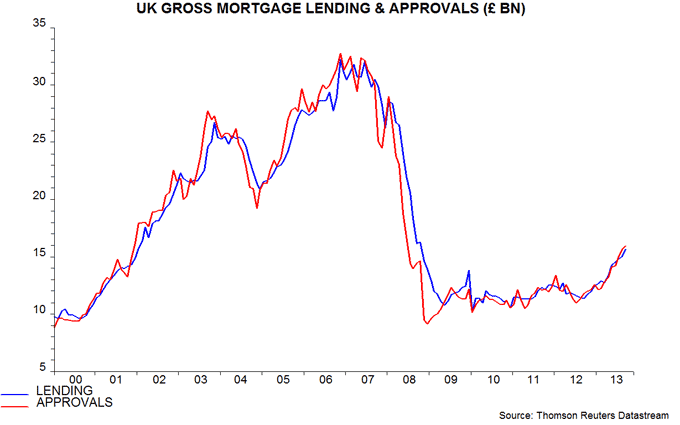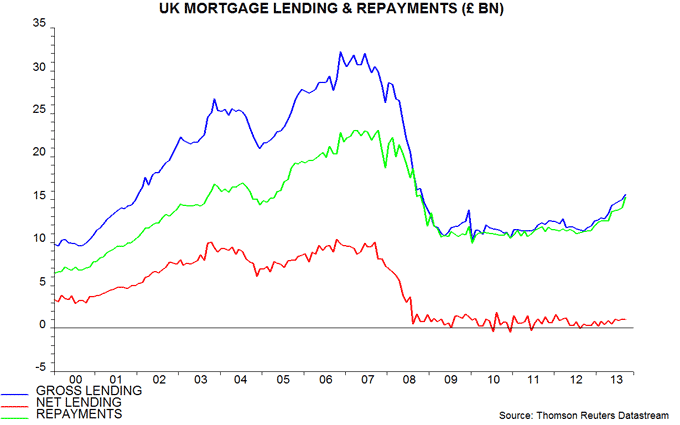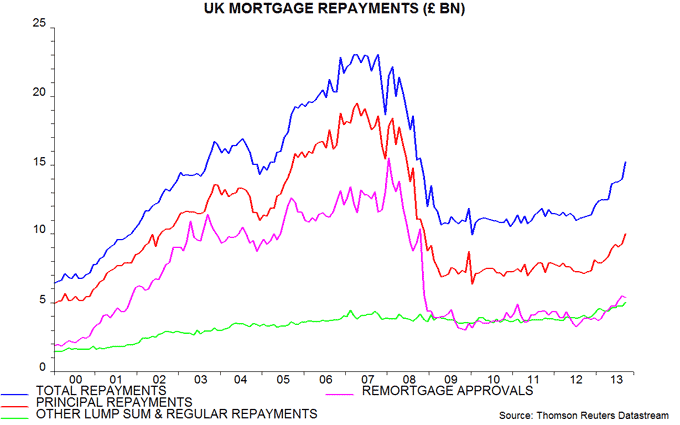UK mortgage lending pick-up offset by increased repayments - net lending still weak
As previously discussed, the commonly-held view that recent stronger UK economic growth reflects consumers gearing up to finance higher spending is not supported by evidence. The stock of lending to individuals, excluding student loans, rose by only 1.0% in the year to September*, while employee compensation – the product of average compensation and employee numbers – gained an annual 3.6% in the third quarter, according to today’s national accounts release.
Undaunted, the debt worriers argue that lending is about to take off, citing a recent surge in mortgage approvals – up by 35% in value terms in the year to September according to comprehensive Bank of England data, with British Bankers’ Association members this week reporting a 31% increase in October. As explained below, however, this surge has already largely fed through to gross mortgage advances but net lending has remained weak. A rise in loan repayments, in other words, has offset the pick-up in gross lending. Stronger net lending, therefore, requires either a further increase in approvals or a slowdown in repayments.
Mortgages on dwellings account for 89% of the stock of lending to individuals. Gross mortgage advances were £15.6 billion in September versus a monthly average of £11.9 billion in 2012, an increase of 31%. Mortgage approvals rose only slightly more over the same period – from £12.0 billion to £16.0 billion, or 33%. So gross advances already largely reflect recent higher approvals.
Net lending, by contrast, remains weak – £1.0 billion in September versus a 2012 average of £700 million. A rise in principal repayments has almost exactly matched the pick-up in gross advances.
The next chart breaks the principal paydown into redemptions and other repayments. Both have increased this year. The rise in redemptions is mostly due to higher remortgaging activity as the funding for lending scheme has allowed borrowers to refinance on more attractive terms. Regular repayments, however, have also increased significantly. This may partly reflect borrowers who have refinanced at a lower interest rate maintaining their monthly payments, resulting in a larger repayment component.
Assuming that repayments continue at their current rate, mortgage approvals need to rise significantly further to signal that consumers are regearing. Consider a scenario in which overall lending growth strengthens from an estimated 1.25% during 2013 (i.e. December to December) to 5% in 2014, with the increase driven by mortgage credit. 5% lending expansion would require a monthly net mortgage flow of £5.1 billion versus £1.0 billion in September 2013. So gross mortgage lending and approvals would need to rise by a further £4.1 billion per month, or 26%.
5% lending growth, of course, would be modest by historical standards and might not exceed income expansion, assuming a continued economic pick-up. A 10% lending increase would require mortgage approvals to climb by more than 60% from the September level.
The help to buy guarantee scheme should contribute to mortgage approvals strengthening further but a rise of 26%, let alone 60%, is doubtful. The government announced earlier this month that 2,384 borrowers had mortgages approved under the scheme in the first four weeks of its operation. This amounts to 3.0% of the number of mortgage approvals for house purchase in September (66,735). Some of these borrowers would probably have obtained mortgages in the absence of the scheme, albeit on more expensive terms.
*October money and lending data are released on Friday.

Reader Comments